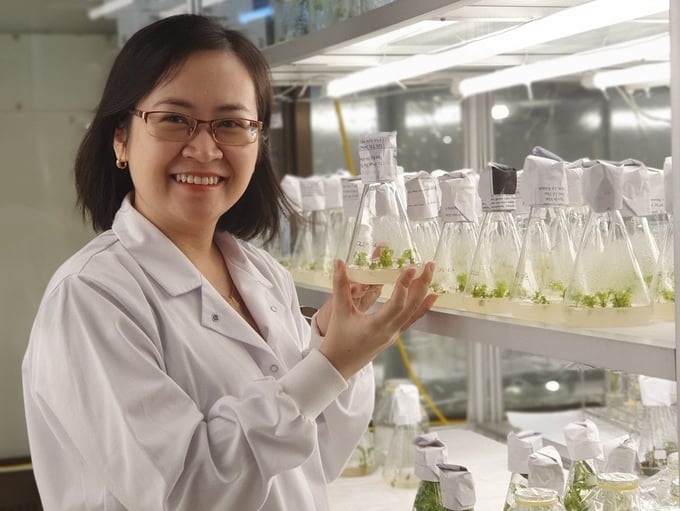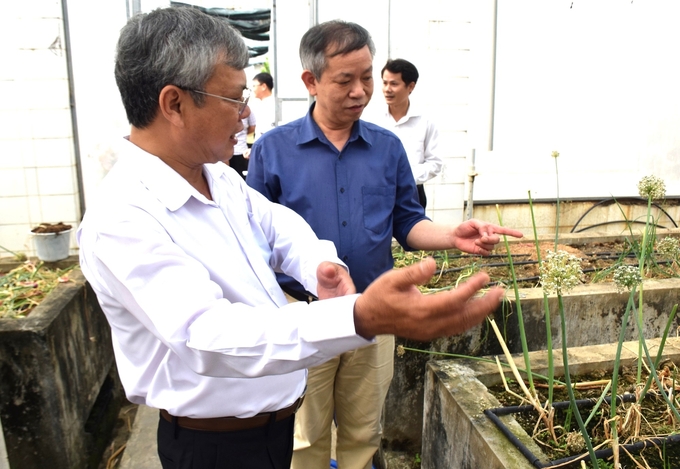November 19, 2025 | 03:05 GMT +7
November 19, 2025 | 03:05 GMT +7
Hotline: 0913.378.918
November 19, 2025 | 03:05 GMT +7
Hotline: 0913.378.918
Vietnam, a country with robust agricultural development, is also facing significant challenges posed by climate change and environmental degradation. However, advances in biotechnology, particularly gene editing technology, are opening new opportunities for the agricultural sector to enhance both productivity and crop quality.
Currently, Vietnamese scientists are conducting research and have achieved initial success in developing drought-resistant rice varieties. In the face of increasingly severe climate change, this breakthrough represents a critical step forward, offering promising prospects for Vietnamese agriculture.

Research on gene editing of crop varieties at the Binh Dinh Center for Information - Application of Science and Technology. Photo: Thanh Tung.
At a recent international conference on gene editing technology, co-organized by Cold Spring Harbor Laboratory (USA), Rencontres du Vietnam, the Institute of Biotechnology under the Vietnam Academy of Science and Technology, and the International Center for Interdisciplinary Science and Education (ICISE) in Quy Nhon (Binh Dinh), nearly 20 scientists and researchers from around the world - representing the United States, China, Australia, Japan, Germany, Korea, India, the Philippines, and Vietnam - delved into the scientific principles and mechanisms of gene editing in plants.
Focusing on recent research into major crops such as rice, soybeans, tomatoes, and sugarcane, the speakers highlighted the remarkable traits that gene editing technology can bring to agriculture, including improved quality and enhanced resistance to adverse weather conditions.
The Institute of Biotechnology, part of the Vietnam Academy of Science and Technology (VAST), is a pioneer in biotechnology. It was among the first institutions in Vietnam to develop and master genome editing technology, successfully applying it to both fundamental research and crop improvement.
Recently, researchers at the Institute have successfully developed and applied the CRISPR/Cas gene editing system to various crops in Vietnam, including rice, soybeans, tomatoes, cucumbers, and papayas. Their gene editing research products are now in the final stages of development and are expected to be introduced into production in the near future.
Currently, researchers at the Institute of Biotechnology have expanded their collaboration in gene editing with domestic institutions such as USTH University, the Institute of Agricultural Genetics, the Maize Research Institute, as well as with international partners like the University of Missouri (USA), the University of Edinburgh (UK), and Ghent University (Belgium). This engagement with gene editing technology not only enables Vietnam to stay at the forefront of the latest advancements in biotechnology but also opens up opportunities to improve crop productivity and quality.
According to Professor Pham Van Toan, Deputy Director of the Vietnam Academy of Agricultural Sciences, gene editing technology, particularly with the advent of CRISPR/Cas and other similar techniques, has unlocked numerous possibilities for researchers worldwide. This technology allows scientists to precisely, efficiently, and swiftly develop improved traits. As a result, new crop varieties can be created that offer higher nutritional value and can thrive in changing climates and adverse weather conditions.
As this technology continues to evolve, it will revolutionize global agriculture and pave the way for a more sustainable future. Vietnam, with its significant progress in biotechnology applications, is poised to contribute further to this transformation, bolstering the competitiveness of Vietnamese agricultural products on the international stage.

Dr. Ho Huy Cuong, Director of the Agricultural Science Institute for Southern Coastal Central of Vietnam (left cover) introduces the purple onion variety research model to Prof. Dr. Pham Van Toan, Deputy Director of the Vietnam Academy of Agricultural Sciences. Photo: V.D.T.
Professor Toan noted that since the 1980s, Vietnam's agricultural productivity has increased significantly, playing a crucial role in ensuring national food security and improving the global standing of its agricultural exports. However, Vietnam still faces considerable challenges due to climate change and environmental degradation. The World Bank has identified Vietnam as one of the five countries most at risk of being severely impacted by global warming in the future.
“In this context, the application of gene editing technology in agriculture offers a viable solution to help Vietnam address the challenges posed by climate change and environmental pressures. At the same time, it will facilitate the development of new crop varieties that are better suited to adverse weather conditions. This is undoubtedly a key global agricultural trend for the future,” Professor Pham Van Toan remarked.
“Our country has now completed the guidelines and established a legal framework for the application of biotech crops, recognizing it as a critical component in advancing sustainable agricultural development. However, as of now, Vietnam still lacks specific legal guidelines for the evaluation and regulation of gene-edited crops,” Professor Toan added.
Translated by Quynh Chi

(VAN) Integrating agricultural extension activities with ecotourism development unlocks promising new avenues for localities boasting specific advantages in grape and apple cultivation.

(VAN) Enterprises and cooperatives accompany farmers in Tay Ninh to develop an organic seedless lime growing area, paving the way for poverty reduction.

(VAN) There were times when Pho faltered, yet his aspiration to bring the pure aroma to those who truly value clean tea kept urging him forward.

(VAN) Bich Thao Coffee Cooperative pioneered products achieving the national 5-star OCOP standard, paving the way for Son La coffee to conquer international markets.

(VAN) The Bao La bamboo-and-rattan cooperative has been producing goods integrated into value chains. As a result, its products have reached global markets.

(VAN) The training course in An Giang equips learners with emission verification methods, thus creating a basis for low-emission rice production.

(VAN) Thu Lum commune is focusing on developing medicinal plants under the forest canopy, creating sustainable livelihoods for local people, and contributing to protecting the ecological environment.